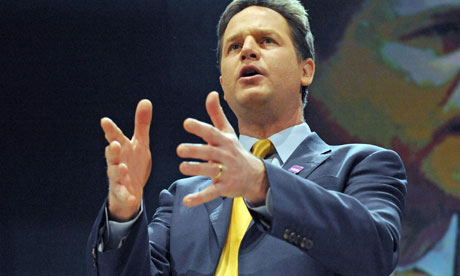
Nick Clegg has put a proposal to George Osborne to make public shareholders in RBS and Lloyds. Photograph: Anna Gowthorpe/PA
A giveaway of government-owned shares in RBS and Lloyds, worth hundreds of pounds to British taxpayers, is being proposed by the deputy prime minister.
Nick Clegg has set out his plan in a letter to the chancellor, George Osborne, in which he says such a move would create 46 million shareholders and allow a form of collective ownership of the banks.
Previous sell-offs of shares in state utilities attempted by the Thatcher administration were derided as gimmicks or short-term tax giveaways since the mass of shares were either immediately sold on or resold to the big pension funds within two years.
Conservatives are likely to argue that denationalisation of the banks, brought into semi-public ownership in the years following the banking crash in 2007, should either be used to reduce the deficit, provide tax breaks or even restore public spending. In practice, the shares are not likely to be sold in the short term since the banks' share prices have not yet recovered and they are not ready for sale.
Speaking during a trade mission to Brazil accompanied by an array of cabinet ministers, Clegg said: "Psychologically it is immensely important that the British public feel they have not been overlooked or ignored. Their money has been used to the tune of billions and billions and billions to keep the British banking system on life support and they have absolutely no say at all in what happens when normality is restored."
Critics will contend that people will have no more say if they own a tiny individual shareholding than if the government collectively owns a larger share. But Clegg claimed his plan would reduce public mistrust in the financial sector.
The mass distribution of shares could mean that everyone on the electoral roll or on the national insurance register would receive an estimated 1,450 shares in RBS and 450 shares in Lloyds. Such parcels would be worth £770 on the basis of current share prices.
The Treasury under George Osborne has not yet opposed such a plan, but might be critical if such a move meant its overriding plans to eradicate the deficit in this parliament were undermined.
RBS shares closed yesterday at 36.65p. The break-even price – in terms of the original purchase price for the government – is 50.4p. Lloyds shares were at 47p; the break-even price is 73p. No government would countenance selling the shares until they had reached the break-even price unless under huge pressure from banking management.
No comments:
Post a Comment